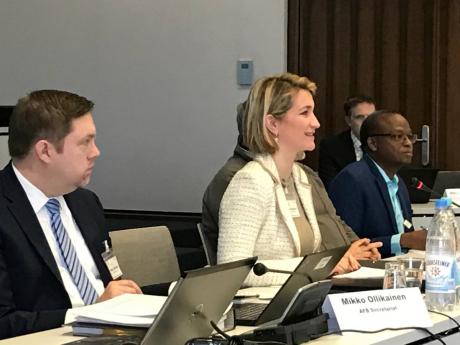Earth Today | Adaptation Fund gets new chair
THE ADAPTATION Fund Board, from which Jamaica has benefited, held its annual change of leadership virtually earlier this month, with Ibila Djibril of Benin officially becoming the new board chair.
The decision was made among a series of procedural moves by the board in a scaled-down virtual meeting, held on April 2, aimed at swearing in new members.
The full 35th board meeting, scheduled for March 31 to April 3 in Bonn, was postponed in early March until a tentative June 23-26 date, due to the coronavirus disease 2019 pandemic. Certain eligible project proposals may be reviewed intersessionally by the board through email vote in the coming days.
Djibril served as vice-chair for the past year and has represented African countries on the board since March 2017. Mattias Broman of Sweden, who has represented Annex I (developed country) Parties on the board, became the new vice-chair.
Djibril and Broman were elected to their new posts at the 34th board meeting last October, and assumed the one-year posts this week. Djibril takes over for previous Board Chair Sylviane Bilgischer of Belgium, who served as chair for the last year presiding over the fund’s robust activities at COP 25 in Madrid in December that resulted in new resources mobilised and solidifying the fund’s long-term institutional arrangements, which contribute to smoothly serving the Paris Agreement.
WEALTH OF KNOWLEDGE
The board chair and vice-chair positions rotate between developing and developed country representation each year.
Djibril brings a wealth of knowledge and experience as a specialist and researcher in environmental management, sustainable development, environmental standards and analysing adaptation vulnerabilities and impacts. He holds master’s degrees in business law and taxation, and an advanced studies diploma in environmental management.
Djibril has also served in several prominent climate-related positions for Benin. He was general director of climate change for the Ministry of Environment and Climate Change, and the national focal point for UNFCCC. In addition, he served as acting general director of climate change management, national director of an integrated adaptation project to address agriculture and food security, director of pollution prevention and environmental projects, and senior environmental technical officer, among others.
Additionally, he was Benin’s national designated authority to the Adaptation Fund from 2011 to 2017, and also for the Green Climate Fund, from March 2016 to February 2017, and a long-time member and vice-chair of the Least Developed Countries Expert Group on Climate Change, supporting vulnerable countries to elaborate and implement their national adaptation plans.
Currently, Djibril serves as coordinator of a large national project, ‘Building core capacity for implementation, monitoring and reporting of multilateral environmental agreements and relevant sustainable development goals in Benin’, which is funded by the Global Environment Facility.
REAL IMPACT
“I’m proud of Adaptation Fund’s (AF) achievements at COP 25, particularly for raising almost US$90 million, despite the difficult context for many countries. I would take this opportunity to really thank developed country donors for their clear and great interest in the Fund and their high confidence in this fund. At COP 25 and the end of 2019, the AF produced remarkable activities with real impact,” said Djibril in an online interview with the Adaptation Fund Board Secretariat.
They include the launch of a brand new US$10-million Innovation Programme to further foster innovation in countries, including through NGOs, the private sector, governments and youth; and the launch of a new interactive knowledge programme to improve access to climate finance among developing countries.
All of these new grants and tools are offered to countries in addition to the fund’s regular concrete project-funding channels. They will help reach even more communities in vulnerable developing countries, and help speed up needed action to serve the adaptation goals of the Paris Agreement.
I can say with satisfaction that AF is a highly functioning fund that attained a milestone in 2018 when parties decided that it shall formally serve the Paris Agreement, and it has been doing so for more than a year now, which is a clear signal of the effectiveness and relevance of its work. It has been in record demand for several years, receiving a consistent stream of record numbers of project proposals. The board approved a record US$188 million in new projects last year alone. This continual high demand reflects the urgency of climate change and the high trust in AF’s work.
Last year, the fund also reached the milestone of 100 concrete projects on the ground, while surpassing 30 accredited national implementing entities through its pioneering Direct Access modality that builds country ownership in adaptation. These results would not have been achieved without the effectiveness of the AF Secretariat team and all bodies involved in the work of AF.

